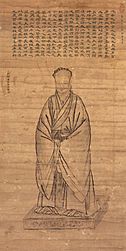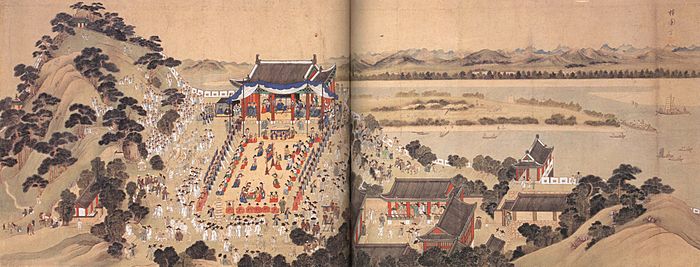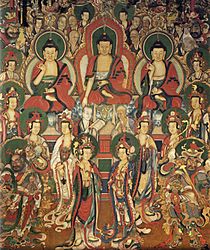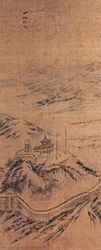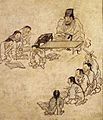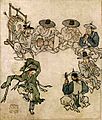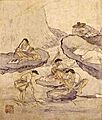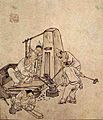Gim Hongdo facts for kids
| Gim Hongdo | |
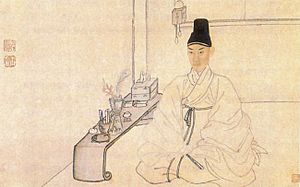 |
|
Quick facts for kids Korean name |
|
|---|---|
| Hangul | |
| Hanja | |
| Revised Romanization | Gim Hongdo |
| McCune–Reischauer | Kim Hongdo |
| Art name | |
| Hangul | |
| Hanja | |
| Revised Romanization | Danwon, Dan-gu, Seoho, Gomyeon-geosa, or Cheopchwiong |
| McCune–Reischauer | Tanwŏn, Tan'gu, Sŏho Komyŏn'gŏsa, or Ch'ŏpch'wiong |
| Courtesy name | |
| Hangul | |
| Hanja | |
| Revised Romanization | Saneung |
| McCune–Reischauer | Sanŭng |
Gim Hong-do (born 1745, died around 1806-1814) was a famous painter from Korea's Joseon period. He was also known as Kim Hong-do, but many people called him Danwon (단원). He was important because he followed traditional art styles but also helped start new ones, like 'true view painting' which showed real places.
Gim Hong-do was amazing at all kinds of traditional painting. But today, he's most famous for his pictures of everyday life, showing regular people doing regular things. His style was a bit like the famous Dutch Masters from a long time ago.
Contents
Life of a Painter
Danwon belonged to the Gimhae Gim family. He grew up in a city called Ansan in South Korea.
When he was just 7 years old, Gim Hong-do started learning art from a famous teacher named Pyoam Kang Se-hwang. Kang Se-hwang was living quietly in Ansan at the time.
In 1766, when Gim Hong-do was 21, his teacher Kang Se-hwang suggested him for a special job. He became a royal painter (called a hwawon) for the Joseon court. This meant he worked for the king!
In 1771, he painted a portrait of the future King Jeongjo. Then, in 1773, he helped another artist named Byeon Sang-byeok paint a portrait of King Yeongjo.
In 1776, Gim Hong-do painted "The Nineteen Taoist Immortals." This painting made him very famous. At the same time, the new King Jeongjo asked him to create many important paintings for the government.
Gim Hong-do died alone and poor. We don't know exactly when or how he died, but it was likely between 1806 and 1814.
His Artistic Legacy
Today, Danwon is remembered as one of the "Three Wons." The other two are Hyewon and Owon. People also often say he is one of Joseon's three greatest painters, along with Owon and An Gyeon from the 15th century.
The city of Ansan, where he grew up and learned to paint, has honored him in many ways. A district in Ansan is named Danwon-gu after him. Ansan also has an annual "Danwon Art Festival." Many public places in the city are designed to look like his artworks.
Famous Paintings
Gim Hong-do was successful in many different types of painting. Here are some examples of his amazing work.
- Paintings that made Gim Hong-do famous:
- 'Literati' paintings (art by educated scholars):
- Official paintings for the government:
- Paintings for the King:
- 'Genre paintings' (showing everyday life). The album Danwon pungsokdo cheop has 25 of these. Here are four:
-
Forge
Daejanggan
- Paintings from after 1800, when King Jeongjo died:
In Books and Movies
Literature
The novel Painter of the Wind, by Lee Jeong-myeong, is about Danwon and Hyewon. In the book, Hyewon is a woman pretending to be a man.
Film and Television
- Park Shin-yang played Gim Hong-do in the 2008 SBS TV show Painter of the Wind.
- Kim Young-ho played him in the 2008 movie Portrait of a Beauty.
- Kim Da-hyun played him in the 2011 SBS TV show Warrior Baek Dong-soo.
See also
 In Spanish: Kim Hong-do para niños
In Spanish: Kim Hong-do para niños
 | Leon Lynch |
 | Milton P. Webster |
 | Ferdinand Smith |


